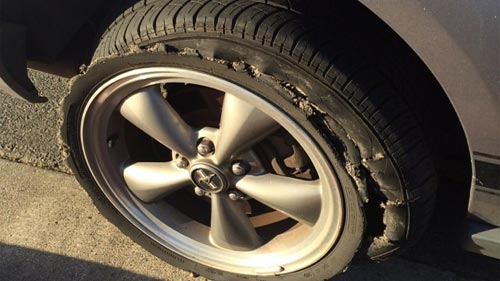
Transportation on roads and highways is a necessary part of our modern society. Some people ride motorcycles, some have private cars, others have big trucks or SUVs. Whatever type of vehicle is used, vehicles save time while commuting and travelling, making the world work more efficiently. In addition to personal vehicles, other people use public transportation to get from point A to point B. Whatever situation you fall into, we need cars for personal reasons like having a vacation somewhere, going to the mall to watch movies in a cinema, or attending classes at school. We can also use cars and trucks for our businesses, by transporting goods that will be sold or delivered to another location. Whatever the reason, Whether it’s saving time, energy, or simple convenience, cars are significant in our lives.
What do all of these vehicles have in common? Tires. Tires are literally where the rubber meets the road, and are one of the most important parts of any vehicle. Unfortunately, sometimes tires can’t handle everything we put them through and end up exploding! But what do you think are the reasons why tires explode? As drivers, tire explosion is one thing you need to be prepared for because it may happen anytime when you are driving along the way.
Sharp Objects
When we are riding in our car, we cannot avoid the reality that there are sharp objects on the ground along the roads and highways. These are small sharp objects like nails, broken glasses, pieces of crystal, steel bars or stone gravels in a rocky road that may cause cuts on our tires and could lead to tire explosion. We as drivers don’t have the power to easily recognize those sharp objects because they are often very small and are located low on the road. There isn’t much you can do about the threat of sharp objects to your tires. If you happen to drive over a sharp object, pulling over and removing the object won’t help you, but you could be the reason why no one else will lose a tire from that sharp object in the future.
Overloading
Sharp objects aren’t the only reason why your tires might explode. Often one of the main reasons why tires explode is due to the increased pressure they get put under when they carry too much weight. That is called overloading. Using your car to pick up a haul of groceries is well within the weight parameters that your tires can handle, so don’t worry about overloading your tires if you decide to bring home an extra tub of ice cream from the grocery store. Overloading typically occurs when carrying extremely heavy loads, like when trucks are moving supplies from one construction site to another without heeding the weight restrictions on the tires and vehicle.
Overloading is also evident in public transportation vehicles like busses, jeepneys, pedicabs, and vans. Sometimes, the number of passengers sitting and some standing will exceed the maximum number of passengers allowed, resulting in blown-out tires. Again, you’re likely not going to exceed weight limits in your personal life, but if you ever need to carry a heavy load in your vehicle, do yourself a favour and check your tire specs first. Or else, you may need to head to a nearby garage for emergency tire service.
Extreme Heat
In addition to sharp objects and overloading, high temperatures also may cause our car tires to explode. Excessive build-up of heat may cause the air inside the cars to become hotter, increasing their internal pressure. The more pressure in the tire, the more it will expand until, eventually, the pressure becomes so intense that the tires will burst. When it is summer season, please be careful when you go take your family or friends on a long-distance road trip because the road surface will also be hotter than usual, and tires may degrade and weaken because of high temperature.
Various Other Reasons
Aside from sharp objects, overloading, and hot weather, some causes of tire explosions are under-inflation, mechanical issues and dangerous road hazards.
Under-inflation happens when the air pressure inside the tire is not enough to fill the tire’s inner tubing properly. If there are mechanical issues like problems with the transmission or drivetrain, they can lead to increased pressure or uneven wear and tear on your tires, making them susceptible to popping.
Dangerous road hazards are also a reason why tires may explode. You could drive over a road hazard at any time, but it often occurs at night when we travel in the darkness, and it is much more difficult to spot hazards or hazard signs than during the day. If you’ve ever driven in Canada, you know that not every road is kept in tip-top shape, and there are road projects that take how many months or even years to finish. That means you should always remain vigilant when behind the wheel to avoid driving into or over hazards that could damage your tires. Sadly, some public roads with no hazard signs may cause car accidents or damage to your vehicle.
Check the Condition of Your Tires
It is important to check the condition of your vehicles, especially the tires, before using them. You can regularly check the tire pressure to make sure everything is okay to reduce the risk of blowing out a tire in one of the scenarios discussed above. If you take good care of your cars and ensure all parts are in good working condition, then the chances of having a tire explode will be drastically reduced. If you don’t know how to check the condition of your tires or other car parts, you need an automotive shop that offers reliable tire service like dood tire.
Tires and tire service may be costly, but it’s for your safety and the safety of others on the road. It’s also a good idea to keep a spare tire at the back of the car or placed under the car, just in case you’re ever in an unfortunate situation when one of your tires explodes.




